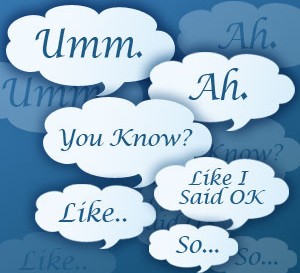Fillers. Those overused sounds or words we insert when speaking in order to…um…get extra time to think for the right word to use next. While in theory, we use them to indicate that we are not done talking- and some even argue they make the speaker sound more natural- linguistic fillers are not useful. In fact, fillers oftentimes indicate the speaker is not well prepared and detract from the listener’s ability to understand the message.
Identifying the filler/s we use most is the first step in eliminating them from our speech. Fillers are used in every language. The most common in English, are “uh”, “um”, “like”, “y’know”, “I mean”, “so”, “actually”, “basically”, and “right”. Listen to yourself talk and try to figure out what filler words you use most. You can begin by recording yourself answering a random question. Otherwise, ask your friends and family what are the fillers you should be watching out for.
Once you have identified the fillers you use, remind yourself to think before you speak. Don’t be afraid to slow down when you are speaking and know that eliminating fillers takes practice. If your mouth moves faster than your brain, you will use a lot more filler words. Taking the time to think about what you want to say will add a pause to your message, but will also add power and confidence to your delivery.



